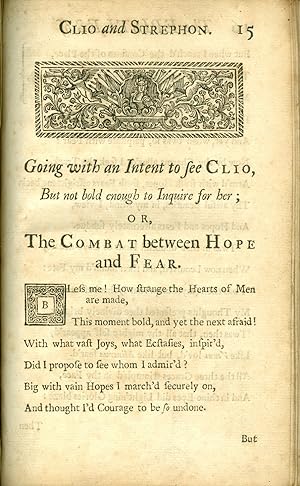About this Item
8vo, pp. lxviii, 131; title page short at foredge, and somewhat darkened; occasional browning throughout; in contemporary sheep, rebacked. Esher bookplate. First edition, first issue. This is the principal work of the writer Martha Fowke (d. 1736), written in collaboration with the journalist and poet William Bond (d. 1735). Fowke came from an established Staffordshire family but both her parents died before she was twenty, and she must have been resilient as she then moved to London to live with friends, and began to make a name for herself as a writer. Her biographer in ODNB is quite circumspect about her 'friendships', but Lonsdale is much more specific: 'although she describes these relationships evasively, she evidently became the mistress of several of her suitors, probably including the Duke of Beaufort and later the Duke of Rutland'. Shortly after this book was published, she made an unhappy marriage to a much older man called Arnold Sansom, with whom she had probably already lived for some time. The element of coercion (her brother is said to have urged the match) may have been present because of this book, whose frankness might have seemed compromising for a family with pretensions to gentility. The correspondence consists of 27 letters, five of them in prose but the rest in verse, each answering the other. The titles of many of the epistles are sometimes very specific, if not necessarily very informative: 'Going with an intent to see Clio, but not bold enough to inquire for her; or, the Combat between Hope and Fear' (p. 15); or 'To Strephon; in answer to the foregoing letter, which was kept a whole month by a lady, to whom the care of it was intrusted, before it was delivered to Clio' (p. 35); and 'To Clio, who just after she tells me she give me leave to love, which she expresses in the finest of verses, tells me in a letter just after that she's going to a brother in Spain' (p. 77). Some of Bond's verse is quite racy, as when (p. 73) he imagines finding her 'Sleeping on her Grassy Bed', and stealing a kiss from her 'blushing Lips', but for the most part the talk is of platonic love and the meeting of souls rather than bodies. At one point, Clio is due to go to Spain to see her brother: Thomas Fowke rose high in the army and eventually became Governor of Gibraltar. Both she and Strephon visit France, although at different times one of his letters is dated from Paris, 'Monday Four of Clock in the Afternoon; Sick in Bed' (p. 109). The book is prefaced by a very long dedication to Sir Richard Steele by 'the editor', who was quite possibly Bond himself there is more about Steele and Fowke than about the male half of the collaboration. Steele had apparently met Fowke and had 'often expressed, in several Companies, the singular Value and Esteem you have for her extraordinary Wit'. This is followed by an exceptionally interesting 'critical essay', full of praise for the poems, more than forty pages long, by one John Porter. Fowke was also much admired by Richard Savage and Aaron Hill; but she had sailed too close to the wind, morally speaking, and Eliza Haywood seems to have found her an inviting target for opprobrium, calling her 'Gloatitia' and accusing her of bringing three illegitimate children to her marriage. Fowke's autobiography was not published until 1752, after Aaron Hill's death. For all her talents, and the admiration her poetry attracted at the time, she is surprisingly little known today. See Foxon p. 282; and Lonsdale, Eighteenth-century Women Poets, pp. 84-5. This first edition is found in two issues: the second issue has a cancel title page with the same imprint, but undated. The collection was reprinted 1729 for the same bookseller (reissued in 1732 under another title), and in 1729 Edmund Curll also published what must be a much abridged edition, a 12mo of only 36pp. ESTC locates just twelve copies of both issues of this first edition. Seller Inventory # 23288
Contact seller
Report this item
![]()
